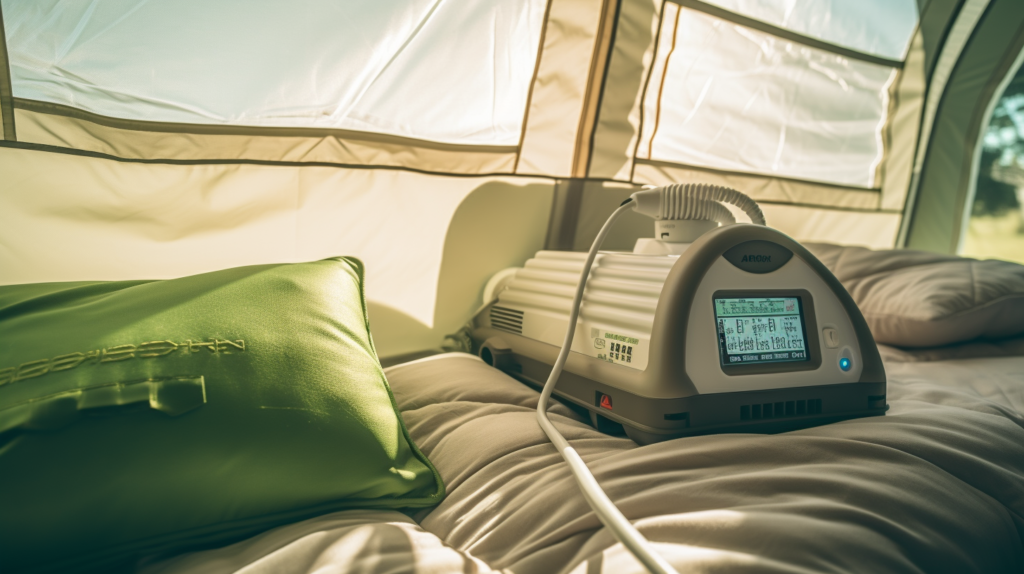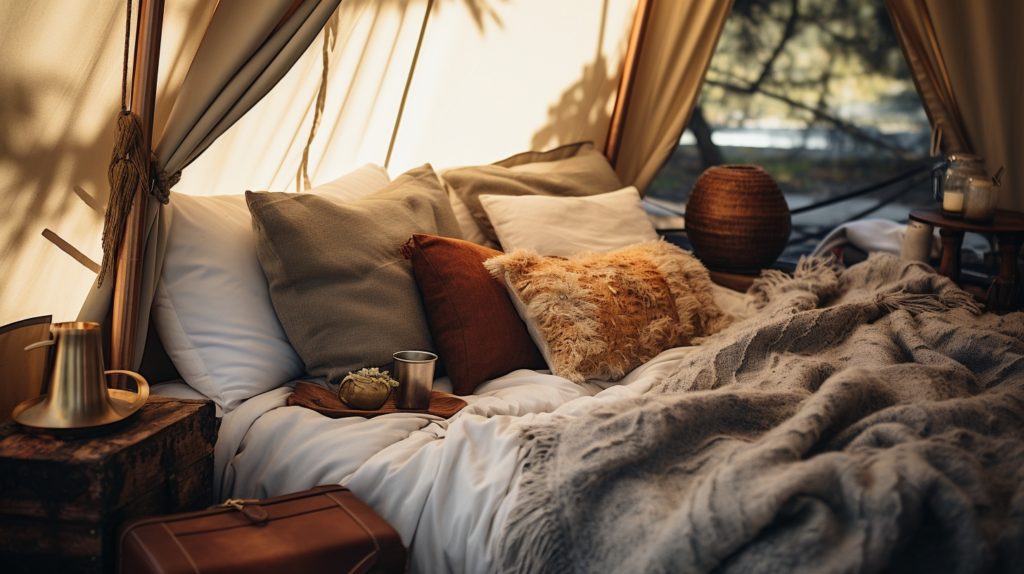Introduction to Camping Without a CPAP Machine
The Role of CPAP for Sleep Apnea Patients
For individuals suffering from sleep apnea, camping without a CPAP machine can become daunting. Sleep apnea is a potentially serious sleep disorder characterized by pauses in breathing or shallow breaths during sleep.
This disruptive condition can lead to fragmented sleep patterns and diminished oxygen supply to vital organs. This is where CPAP (Continuous Positive Airway Pressure) comes into play as a supplement for sleep apnea patients.
A CPAP machine acts as an air pump, providing continuous pressurized airflow through a mask worn over the nose or mouth while sleeping. The pressurized air helps keep the airways open, preventing obstructions and allowing uninterrupted breathing during slumber.

The Challenges Faced by CPAP Users While Camping
For those who rely on their CPAP machines, camping presents unique challenges that disrupt their usual routine. The main hurdle is the absence of electricity in most outdoor settings.
Since traditional CPAP machines require electrical power to function optimally, this creates a predicament when venturing into remote campsites without access to reliable power sources. Portability becomes another significant concern.
Traditional CPAP machines are usually bulky and heavy due to their built-in humidifiers and other features. Hauling such equipment along with camping gear can be an annoying task that detracts from the joy of exploring nature’s beauty.
Preparing for Camping Without a CPAP Machine
Consultation with healthcare provider
Before going on a camping trip without your trusty CPAP machine, seek advice from your healthcare provider. Schedule an appointment and discuss your plans with them. They will be able to offer guidance tailored to your specific needs and help you explore alternative sleep apnea treatments and devices that could be suitable for camping.
During the consultation, share details about the duration of your trip, the environmental conditions you expect to encounter, and any concerns or challenges you anticipate. Your healthcare provider may recommend adjustments to your current treatment plan or suggest modifications based on their expertise.
Alternative sleep apnea treatments and devices
Not being able to use your CPAP while camping doesn’t mean you have to sacrifice a good night’s sleep. There are several alternative sleep apnea treatments and devices available that can provide relief during outdoor adventures. Oral appliances can be custom-made by dentists specializing in dental sleep medicine.
These appliances work by repositioning the jaw or tongue in a way that helps keep the airway open during sleep. They are comfortable, portable, and can be an effective solution for mild to moderate cases of sleep apnea.
Positional therapy is another option worth exploring. This approach involves training yourself to maintain proper sleeping positions that minimize airway blockage throughout the night.
Some individuals find success using specially designed pillows or wearable devices that alert them when they are not in the optimal position. Nasal dilators are yet another alternative worth considering if nasal congestion contributes significantly to your sleep apnea symptoms.
These small devices gently open up nasal passages, facilitating better airflow during sleep. They come in various shapes and sizes, including adhesive strips or nasal cones that fit inside the nostrils comfortably.
Exploring these alternatives with guidance from medical professionals will help you make informed decisions about the best options for your camping adventure. Remember, preparing in advance and understanding your alternatives can make all the difference in ensuring a restful sleep under the stars.
Choosing the Right Campsite for Sleep Comfort
Researching campgrounds with electrical hookups or generators
When planning a camping trip without your trusty CPAP machine, it’s crucial to find a campground that offers electrical hookups or generators. These power sources will be your lifeline to alternative sleep apnea treatments and devices.
Take the time to research campgrounds in your desired location and check whether they provide electricity. Many reputable camping websites allow you to filter your search based on amenities, so make sure to tick the “electrical hookup” box before hitting that search button.
Selecting campsites away from noise and distractions
The beauty of camping lies in its peace, but it can quickly turn into a noisy nightmare if you’re not careful. To ensure a good night’s sleep while camping without CPAP, select campsites away from noise and distractions.
Avoid locations close to busy roads, hiking trails, or group activity areas where late-night revelers might gather. Consider choosing a campsite nestled amidst nature’s serenity – perhaps by a babbling brook or surrounded by trees whispering in the wind.
Not only will this provide a peaceful ambiance conducive to sleep, but it may also offer natural white noise that can drown out any surrounding disturbances. Remember, when selecting a campsite for sleep comfort, it’s all about finding that perfect balance between convenience and seclusion.
Sleeping Gear and Accessories for Camping Without CPAP
Sleeping bags and sleeping pads suitable for comfort and support
When it comes to camping without a CPAP machine, comfort during sleep becomes paramount. Choosing the right sleeping bag and sleeping pad can make all the difference in ensuring a restful night.
Look for a sleeping bag that offers ample insulation to keep you warm, especially if you plan on camping in cooler temperatures. The two main types of insulation used in sleeping bags are down and synthetic.
Down insulation is known for its exceptional warmth-to-weight ratio, while synthetic insulation provides better water resistance. Consider your specific needs and the climate you’ll be camping in before making a decision.
Equally important is selecting a comfortable sleeping pad that provides adequate support. The R-value of a sleeping pad refers to its insulation rating, indicating how well it traps body heat.
For campers who prefer colder climates, opt for a higher R-value pad to prevent heat loss from the ground. However, if you’re camping during warmer months, you may choose a pad with lower insulation properties.
Pillows designed to promote better breathing and reduce snoring
A good night’s sleep also depends on having an appropriate pillow that promotes better breathing and reduces snoring tendencies. Look for pillows specifically designed with these goals in mind.
Some pillows are contoured to provide proper alignment of the head, neck, and spine while facilitating clear airways during sleep. Memory foam pillows help distribute weight evenly while conforming to individual head shape—ideal for those who suffer from sleep apnea or other respiratory issues.
Some pillows even have cooling gel technology to regulate temperature throughout the night. Don’t underestimate the impact of your pillow choice on your overall sleep quality when camping without CPAP equipment—it could be the key element that ensures restful nights amidst nature’s embrace.
Remember, while camping without CPAP does present challenges, the right sleeping gear and accessories can significantly improve your sleeping experience. Investing in a suitable sleeping bag, proper insulation rating on your sleeping pad, and a pillow designed to enhance breathing can help you enjoy the great outdoors while ensuring a good night’s sleep.
Creating a Sleep-friendly Environment in the Tent
Ventilation Considerations
When it comes to camping without CPAP, ensuring proper ventilation inside your tent becomes even more crucial. Good airflow helps to maintain a fresh and comfortable atmosphere, allowing for a restful night’s sleep.
You certainly don’t want to wake up feeling stuffy or suffocated! So, let’s explore some key ventilation considerations for your camping setup.
Tent Design Features that Promote Airflow
Choosing the right tent design can significantly impact the airflow within your sleeping quarters. Look for tents with features that enhance ventilation and breathability. Opt for tents with multiple doors or large vestibules that can be opened up to allow air circulation.
Choose tents that have vents near the top or on the sides to facilitate cross-ventilation. These vents promote better airflow and prevent condensation buildup, minimizing any potential discomfort during your slumber.
Using Mesh Panels or Windows Strategically
Mesh panels and windows are excellent assets when it comes to keeping fresh air circulating throughout your sleeping area while keeping insects at bay. Utilize these features strategically by opening them during cooler hours of the day or when there is a gentle breeze outside. This allows you to enjoy natural ventilation without compromising on privacy or safety.
Consider positioning your tent in a way that takes advantage of prevailing winds, if possible. By aligning the mesh panels/windows with the direction of the breeze, you can create an efficient flow of air through your tent—helping you stay cool and comfortable throughout the night.
Remember, maintaining adequate airflow is essential not only for optimizing sleep quality but also for combating condensation which can lead to dampness inside the tent. Creating an environment conducive to restful sleep in your tent requires thoughtful consideration of ventilation options within its design and layout—thus ensuring you have a refreshing camping experience even without your trusty CPAP machine.
Natural Remedies to Aid Sleep without CPAP
When it comes to camping without CPAP, finding natural remedies to aid sleep can be incredibly helpful in promoting relaxation and ensuring a restful night under the stars. While these remedies may not replace the effectiveness of CPAP machines for sleep apnea patients, they can certainly provide some relief during camping trips. Let’s explore two popular natural options: herbal teas and essential oils.
Herbal teas that promote relaxation
Enjoying a warm cup of herbal tea before bed has long been known to help calm the mind and prepare the body for sleep. Certain herbal teas have specific properties that promote relaxation, making them ideal for campers seeking a good night’s rest without their CPAP machines.
Chamomile tea is perhaps one of the most well-known options in this category. It contains compounds that act as mild sedatives, helping to induce sleepiness and reduce anxiety.
Lavender tea is another excellent choice, as lavender has been used for centuries for its soothing effects on the nervous system. If you prefer a more tangy flavor, passionflower tea can be a great option.
This classic brew has been used traditionally as a natural remedy for insomnia and anxiety due to its calming properties. Other potential choices include valerian root tea, which is believed to enhance deep sleep, and lemon balm tea, known for its ability to reduce stress and promote relaxation.
Essential oils known for their calming effects
Aromatherapy with essential oils can work wonders when it comes to relaxing the mind and body before bedtime while camping without your trusty CPAP machine. Essential oils are highly concentrated plant extracts that are renowned for their therapeutic properties. Two popular options known for their calming effects are lavender oil and chamomile oil.
Lavender oil has a soothing floral aroma that helps to reduce anxiety and promote relaxation. It can be diffused in the air using an essential oil diffuser or diluted with a carrier oil and applied topically to pulse points such as the wrists or temples.
Similarly, chamomile oil, with its gentle and sweet scent, is known for its ability to induce calmness and improve sleep quality. A few drops of chamomile oil added to a warm bath or applied to a cloth near your sleeping area can create a serene atmosphere conducive to restful sleep.
Remember to choose high-quality, pure essential oils from reputable sources, as synthetic or adulterated oils may not provide the desired benefits. Always follow safety guidelines and consult with a healthcare professional before using any new herbal teas or essential oils.

Lifestyle Adjustments to Improve Sleep Quality
Maintaining a Regular Sleep Schedule while Camping
When you’re camping without your trusty CPAP machine, it becomes even more crucial to establish a regular sleep schedule. Our bodies have internal clocks, known as circadian rhythms, which thrive on routine.
By sticking to a consistent sleep schedule, you can help regulate your body’s natural sleep-wake cycle and improve the quality of your sleep while enjoying the great outdoors. To maintain a regular sleep schedule while camping, try to go to bed and wake up at the same time every day.
Yes, this means resisting the urge to stay up late by the campfire telling ghost stories or being lured out of your sleeping bag by an early morning sunrise hike. Consistency is key here!
While it might be tempting to deviate from your routine for those special camping moments, try not to throw off your body’s internal clock too much. It’s also helpful to plan your daily activities around this schedule.
Ensure that you keep yourself engaged during the day with exciting outdoor adventures or relaxing activities so that when bedtime approaches, you will naturally feel tired and ready for a good night’s rest. Remember, keeping a regular sleep schedule is about finding balance between enjoying your camping experience and taking care of your body’s need for rest.
Engaging in Relaxing Activities before Bedtime
After an eventful day exploring nature’s wonders or engaging in thrilling outdoor activities while camping without CPAP, it’s crucial to wind down properly before bedtime. Engaging in relaxing activities can help calm both your mind and body, making it easier for you to drift off into dreamland under the starry sky.
One excellent way to unwind before bed is through gentle stretching exercises or yoga poses specifically geared towards relaxation. These movements help release any built-up tension from hiking or other physical activities, promoting relaxation and preparing your body for sleep.
Another relaxing activity to consider is reading a book. Choose something that captivates your interest but isn’t overly stimulating or intense.
A good book can transport you to another world, helping to quiet your thoughts and prepare you for a peaceful night’s sleep. Don’t underestimate the power of nature’s soothing sounds.
Take a moment to appreciate the tranquility around you, whether it’s the rustling leaves or the distant sound of flowing water. Embracing these natural sounds can create a serene ambiance that promotes relaxation and prepares you for restful sleep amidst the beauty of the wilderness.
Remember, by maintaining a regular sleep schedule and engaging in relaxing activities before bedtime, you can optimize your chances of getting quality sleep while camping without CPAP. Don’t let the absence of your CPAP machine deter you from enjoying an enriching outdoor experience and waking up refreshed and rejuvenated each morning!
Coping Strategies for Unexpected Interruptions during Camping Trips
Dealing with noise disturbances at night
Camping in nature can be a serene and peaceful experience, but sometimes unexpected noises can disrupt your sleep. Whether it’s the distant howling of coyotes or the chatter of nearby campers, dealing with noise disturbances requires some clever strategies.
One option is to invest in a trusty pair of earplugs. These little wonders can help block out unwanted sounds and create a more peaceful environment for sleep.
Slip them in before you hit the sack, and you’ll be amazed at how they whisk away those bothersome noises. If you prefer something less intrusive, noise-canceling headphones might be your answer.
These nifty gadgets use advanced technology to analyze ambient sound waves and produce counteracting frequencies to cancel out the noise. Simply slip them on, activate the noise-canceling feature, and let yourself drift off into dreamland undisturbed by outside noises.
White noise machines or smartphone apps
Another effective way to cope with unexpected interruptions during camping trips is by using white noise machines or smartphone apps that generate soothing sounds. White noise refers to a consistent sound that masks other sounds, helping create a peaceful and uninterrupted sleep environment. Portable white noise machines designed specifically for travel are available on the market.
These compact devices emit a range of calming sounds like ocean waves, rainfall, or gentle fan hums that drown out disruptive noises and lull you into deep slumber. For those who prefer traveling light, numerous smartphone apps offer similar functionalities as white noise machines.
With just a few taps on your phone screen, you can access an array of ambient sounds tailored to your preferences – from soft raindrops pitter-pattering on leaves to distant thunderstorms rumbling through valleys. Simply plug in your earphones or place your phone near you while sleeping, and let the pleasant sounds transport you to a dreamland, undisturbed by any unwelcome noises.
Conclusion
Camping without CPAP can be an exciting adventure, but it requires careful planning and consideration. By consulting with your healthcare provider and exploring alternative sleep apnea treatments, you can find solutions that allow you to enjoy nature without compromising your rest.
Choosing the right campsite, investing in suitable sleeping gear and accessories, creating a sleep-friendly environment in your tent, utilizing natural remedies, and implementing lifestyle adjustments will all contribute to a more comfortable camping experience.
Remember that unexpected interruptions are bound to happen during camping trips. Whether it’s noise disturbances or other unforeseen circumstances, being prepared with coping strategies is essential.
By using earplugs or noise-canceling headphones, or even employing white noise machines or smartphone apps that generate soothing sounds, you can minimize disruptions and ensure a peaceful night’s sleep under the stars. So embrace the beauty of nature and embark on your camping adventures with confidence, knowing that even without CPAP, you can still indulge in restorative rest while surrounded by the wonders of the great outdoors.
